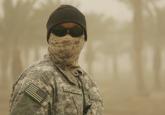The VA established the Airborne Hazards and Open Burn Pit Registry to help track and understand the long-term health effects of exposure to burn-pit smoke (from waste disposal) and other airborne hazards. Since its launch in 2014, nearly 61,000 veterans and service members have signed up. But that’s only a “small fraction” of the estimated 3 million who may be eligible, says Dr. Stephen Hunt, National Director of the VA’s Post-Deployment Integrated Care Initiative.
Hunt says the registry helps veterans in a number of ways. First, it gives veterans an opportunity to document any concerns they have about deployment-related exposures. It also provides an opportunity to obtain a free health evaluation by a VA or DoD provider. This evaluation can ensure ongoing follow-up for existing health conditions or any conditions that emerge “down the road.”
Participation is voluntary and free. It is not required to obtain disability compensation benefits, nor does the veteran need to be enrolled in the VA health care system. A Registry note in the medical record summarizing the veteran’s exposure concerns and related medical treatment can serve as evidence for a claim, but is not necessary to the claims process. The questionnaire is based on recollection of service, not the participant’s military record.
[embed:render:related:node:103978]
The Registry is open to anyone who served in Iraq, Afghanistan, Djibouti (on or after Sept. 11, 2001), or Southeast Asia (after 1990). Signing up takes about 40 minutes, at https://veteran.mobilehealth.va.gov/AHBurnPitRegistry.
Reports on research findings so far from the Registry are available at www.publichealth.va.gov/exposures/burnpits/registry.asp. Health care providers can find more information in the fact sheet available at www.publichealth.va.gov/docs/exposures/burn-pit-registry-fact-sheet.pdf#.

